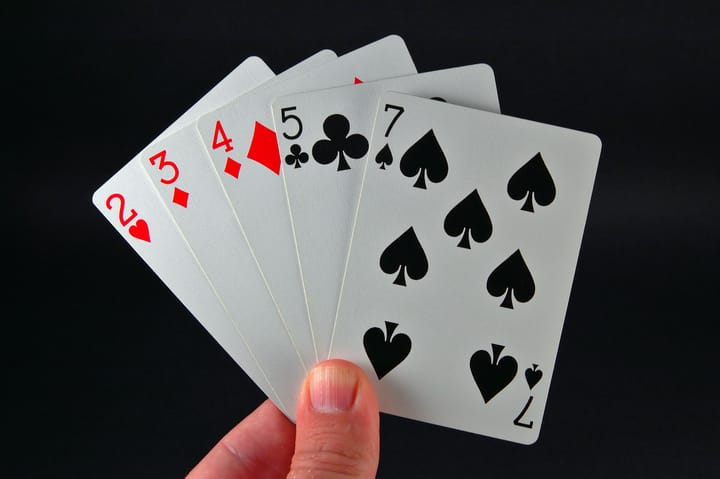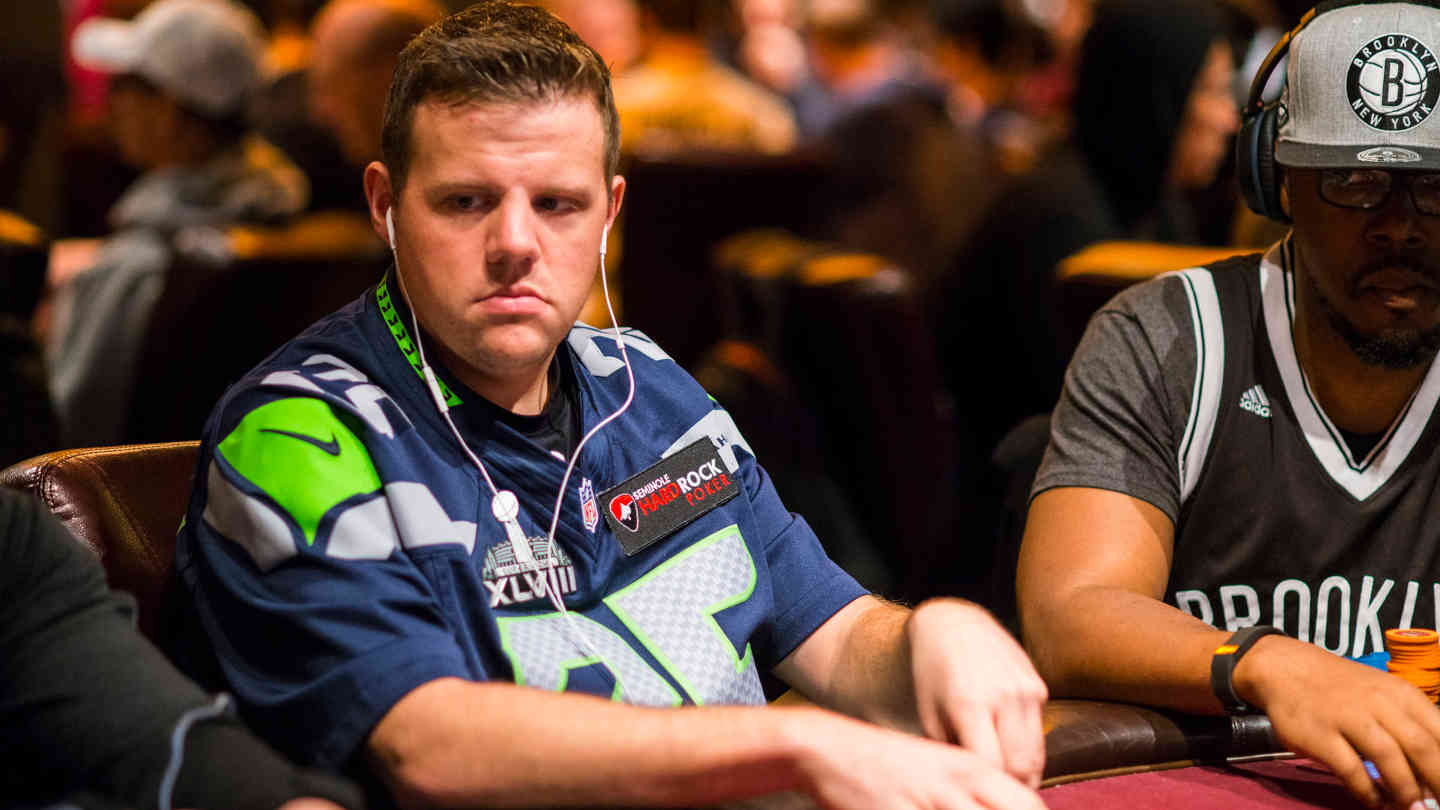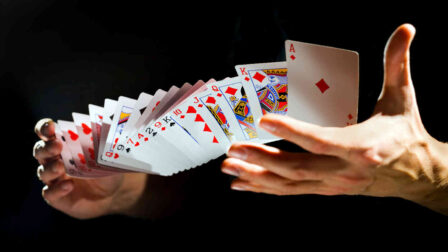How to Play Badugi Poker

9 minutes
Last Updated: March 19, 2024
The poker world has evolved greatly since the days of the poker boom, and many poker games that used to barely exist have since emerged onto the big scene.
Badugi is a poker variation that was allegedly played in Vegas even 40 years ago but really got into the mix games around Vegas during the past couple of decades.
While the game is spread in live casinos on occasion, you will find most Badugi poker games in online poker rooms.
Badugi poker is also often part of mixed games in which different games are dealt in turn, and it is useful to be good at every game.
This is a short guide to Badugi rules and Badugi strategy that will help you start playing and beat those who don’t yet understand what the game is all about.
If you haven’t played the Badugi card game before, let’s go over the basic rules and hand rankings first and move on from there.
Basic Badugi Poker Rules & Gameplay
As you probably know, there are many different poker variants, and they are not all played the same way.
In the most basic sense of the word, Badugi is a draw poker game, which means it has some similarities with games like Five Card Draw or 2-7 Triple Draw.
Badugi poker is usually played with six players at the table, like most other games in the mix. A dealer is determined randomly, and the two players to his left post the small and big blind, like they would in Texas Hold'em.
Once the blinds have been posted, the dealer deals out four cards to each of the players, going in a circle around the table, dealing one card at a time.
After each player has received four cards, they take turns making their first bets. Players can call the original bet or choose to raise it.
The game can be played as a limit, pot-limit, or no-limit, impacting the size of the raise that a player can make.
In a fixed limit Badugi game, the bets and raises are fixed and pre-determined. In a pot-limit game, the pot size is the limit of the bet you can make. Finally, in a no-limit game, you can bet all your chips at any time.
Once all the pre-flop betting is done, the remaining players get to draw. Each player can stand-pat or replace as many as four of their cards with new ones.
After the first draw is completed, another betting round ensues. Once again, players who stay in the hand have the option to stand-pat or draw up to four cards.

A new betting round follows the second draw. Once it is done, players can draw for the one last time and then bet again during the third betting round.
Once all the drawing and betting rounds are completed, the players turn their hands over. The winning hand is determined according to the Badugi hand rankings.
Hand rankings are an important part of Badugi rules. If you don’t know what those are, let’s go over them and find out just how hands are ranked in this poker variant.
Badugi Hand Rankings
Before you can start playing the game, you will need to learn all about Badugi hand rankings, which may not be intuitive to you if you are coming in from another poker game.
Unlike most poker games in which high cards are considered good, in Badugi, you are looking for low cards, but aces are counted as the lowest card in the deck. So poker hands rankings in Badugi are quite a bit different.
Apart from wanting low cards, you will also need your cards to be in four different suits. All hands with four different suits are called Badugi, or four-card Badugi.
The ideal hand combination in the Badugi card game is A 2 3 4, all in different suits. However, other full Badugi hands can also be strong, as it can be hard to make one.
Another thing to note is that pairs don’t work for you in Badugi poker, so you will want to discard a paired card if you get one.
If no player can make a Badugi, a three-card Badugi will win the hand. The hand with the lower top card will always win in such cases. For instance, 9s 7c 4d 4c will beat Js 4h 3d 3h.

In setting up your Badugi hand, you will always be aiming to make a four-card Badugi, but depending on the opponents' drawing, a three-card or two-card Badugi may also be good.
Here are a few examples of hands you may get dealt in Badugi:
Badugi (The Nuts)
- As 2d 3c 4h
Badugi (9 High)
- 3h 6d 7c 9s
Three-Card Badugi
- As 3d 5c 5s
Two-Card Badugi
- As 3d 3h 9s
Worst Possible Hands
- As 4s 5s 8s
- Ks Kd Kh Kc
As you can see, Badugi rules are somewhat different from those of most other poker variants. This isn't anything to worry about, as you'll get the hang of it once you start playing, but you might make some mistakes during the early days. Don't worry about it – that's perfectly normal.
How to Play Badugi Poker
Now that you know how Badugi hand rankings work and what kind of hands you are looking for, as well as what the betting pattern is, let’s talk a bit about some basic Badugi strategy.
First of all, you should remember that this is a draw game, which means you have very limited information as you don’t see any of your opponents’ cards.
This makes poker positions even more of a factor than it would be in a game like No-Limit Hold'em, where you can see the community cards and have some ideas and opportunities which don't exist in Badugi.
Being in position means you get to draw last and bet last. Seeing your opponents’ act on their hands will be a great way to determine what to do.
While making a strong Badugi poker hand is the easiest way to win, bluffing is also very much a part of this game.
Against weak opponents, who you will frequently face at the lower stakes, you will often be in position and up against someone who is drawing several cards.
Remember, when a player draws more than two cards, there is a very low chance of them making an actual Badugi. Instead, they will often end up with two or three-card hands.

As the action approaches the third betting round, you will start getting an idea of whether their hand has improved, as they will now draw fewer cards if it has.
Conversely, your opponents may try to bluff you by standing pat or drawing only one card and then betting, regardless of their holdings.
You can use this same strategy to bluff them, and if you also hold position, you will be in great shape to get your bluffs to work.
Yet, remember that in a limit game, players without much experience will rarely fold, which makes bluffing less valuable and going for value with your big hands even more important.
A Rundown of a Typical Badugi Poker Hand
So you have learned about the hand values, basic Badugi rules, and a bit of strategy. Let’s now apply it all to an actual hand of Badugi and see how it may play out.
As an example, I will show you a hand of $5/$10 Badugi I’ve played recently:
The stakes are $5/$10, which makes the original blinds $2.5/$5, and I am dealt:
As 3c 9s Js
My hand is good for a three-card Badugi, which is solid to start with. I am sitting in the cutoff and the players to my right fold. I make a raise to $10. The button folds and the blinds both call my raise, taking us to the first draw.
I am forced to discard my Js and 9s after my opponents also discard two cards each. I end up with this hand:
As 3c 3h 7h
I now have a three-card seven, which is a very solid holding. The blinds both check, and I fire a continuation bet of $5, which both players call. There is now $45 in the pot.
Both players discard two, and I discard my 3h. I am dealt the 5d, which is one of the best cards I could have hoped for, giving me a monster. I now hold:
As 3c 5d 7h
The stakes have now doubled, and the small blind comes out leading for $10. The big blind folds and I raise to $20. He re-raises to $30, and I put in the final $40 bet.
The final draw ensues, and my opponent now draws one, indicating that he doesn't have a Badugi yet, but rather a strong three-card hand. I stand pat.
My opponent looks at his cards again and now checks. I have a clear value bet here, and I bet the $10, which is instantly called by the blind, who actually ended up with:
2s 4c 6d Kh
He made a Badugi in the end and was hoping I was bluffing with my stand-pat on the last draw. The power of position paid out in this one, as we definitely made some extra bets.

Final Words on Badugi Poker
You now know how to play Badugi poker and are ready for your first hand. I highly recommend playing online for practice first since you can play for some really low stakes.
Before you do jump in, here is a quick cheat sheet with some basic facts about the game that you can always look at to refresh your memory:
- Badugi is a hand made up of four cards of different suits. The lower your cards are, the better your Badugi.
- If you have a pair in your hand, the paired card does not count. If you have two cards of the same suit, only the lower one counts.
- A Badugi always beats a three-card hand, and a three-card hand always beats a two-card hand.
- To win, you will want your highest card to be lower than your opponent’s.
- If your opponent is still drawing and you have a Badugi, it’s time to bet and raise. If they are drawing more than one, your three-card hand is usually good.
- Playing in position will help you make more money when you make big hands and lose less when you don’t. Try to play in position as much as possible.
- The Badugi card game is usually played as a limit game, so there is a limit to how much you can bet on each street.
- Don’t hesitate to let go of your weak hands if they don’t improve by the time the first draw is over.
- Like with any other poker variation, discipline and good bankroll management are key to long-term success.


















